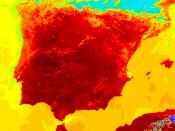In the late 1500s and early 1600s, the Americas had been discovered and establishment of the New World had begun. Spain, Portugal, England and France all led the way in early colonization. European nations were involved in the colonization of North and South America, but all had different approaches. Spain and Portugal were similar in the way they inhabited the land but had different reasons for colonization. France approached colonization somewhat different, they were not focused on land but on the economical impact that trade would have on their nation. England focused on colonization of North America completely different. The English had a deeper desire to explore the new world and expand their nation. The English proved to have had the best and worse approach of all the nations colonizing America. Their approach led to the formation of a new nation but not under their control. The vast differences of all the nations and the imprint they left in their region of colonization shaped the New World into what the North and South America is today.
Spain and PortugalThe Spanish and Portuguese shared the desire to achieve economical superiority over the other European nations. The Treaty of Tordesillas in 1494 made the Spanish focus all their attention to the Americas, while the Portuguese spread their colonies throughout Africa, Asia, and modern day Brazil. The treaty allowed the Spanish to colonize all Latin America, Florida, and much of Western America, (Koeller 1998). Spain was on the threshold of becoming the richest nation in the world. Both the Spanish and Portuguese would enforce their ideals, religion, and authority over the native inhabitants through military force under the order of their Kings. The colonists for Spain and Portugal were governed by their homelands and had a strong tie to their country.
FranceNot until 1605 did the French plant a permanent colony; Port Royal in Arcadia, (Davidson et al 2001). The French, a strong sense of loyalty to their country, but viewed the New World in a different way. For France, they saw America as a surplus of economical assets through fur trade, agriculture communities, and religious institutions, (Davidson et al 2001). They did colonize in the New World through Canada and the Mississippi and Ohio River Valleys but not to the extent of the other European nations. They were so focused on fur trade and knew that good relations with the Native Americans would be the key to their success. Some French did own their land but they did not forcefully take it. Their willingness to work with the Native Americans fostered a good sense of loyalty between them; some taking on the native way of life. This loyalty fostered many interracial marriages between the French and Indians. This created a need for the colonists to homestead there, but they never seemed to establish any form of self government, (Davidson et al 2001).
EnglandEnglish colonized for religious freedom, to seek refuge, and new economic opportunities. The establishment of a local legislature or government was something completely unique to all the 3 British colonies. Every one of them had some form of self-appointed government. This was one of the driving factors for English settlers coming to America along with the majority of them would own the land they lived and worked on. Religious freedom was probably the most important reason for colonization. Religious prosecution in England in this time was quite severe. This drove thousands of Englishmen to America seeking religious refuge. England embraced the colonization movement for various reasons. Population levels in Great Britain were increasing too rapidly to support the citizens desire to own land. Furthermore, diseases were spreading rapidly and wiping out much of the European population. The financial benefits the American colonies would provide through trade with Great Britain would also be greatly beneficial, (Davidson et al 2001). All these circumstances gave the English settlers belief in a New World and a fresh start. For this reason English settlers brought their families with them to the New World. Every situation, reason, and circumstance ultimately gave the original 13 colonies the keys to America.
ConclusionBoth Spanish and English settlers encountered many problems in the colonization of the New World: hunger, disease, and death. Similar to the English, the Spanish also colonized the lands of the New World and developed large cities, which served as political and economic centers. Although they both explored the New World, there ambitions and methods of achieving them showed many differences. The Spanish employed officials to rule the New World, whereas the English relied on direct ties to the royalty to help run their colonies. The treatment of Indians varies differently between the two groups. The English acquired slaves from Africa for the required labor needs. Spain forced Indians into a life of slavery. Lastly, their motives for exploration were vastly different. Spain's motives were to plunder gold and riches from the Indians, whereas the English were more interested in natural wealth and freedom of religion.
The European nations had different plans for colonization of the New World but not one of them was as effective as the English. England's approach of land ownership, which spurred self-appointed government, was the key to having people feel a sense of purpose, ownership, and pride. A citizen with a sense of purpose will fight to keep this feeling no matter what the cost. This was evident in the numerous wars and battles the English colonies fought and won. This feeling is what makes our country so successful today.
ReferencesKoeller, D. W. (1998). In Central and South America Chronology. (sect. The Treaty of Tordesillas). Retrieved May 11, 2007, from http://www.thenagain.info/WebChron/Americas/Tordesillas.htmlDavidson, J. W., Gienapp, W. E., Heyrman, C. L., Lytle, M. H., & Stoff, M. B. (2001). Nation of Nations: A Concise Narrative of the American Republic. In Old World, New Worlds (Prehistory-1600) (Vol. 1, p. 1-29). The McGraw-Hill Companies.


